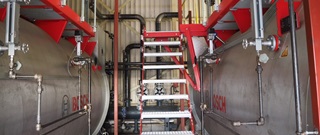Replacing old boilers with a greener solution
One of the site’s other original features is the boiler house and, up until recently, its contents. The two boilers inside were decades old, and while they worked hard to help move and store LPG, they were also operating at an estimated 50% efficiency level. They have now been replaced with a more modern, more efficient and greener solution. The new boilers have features such as flue gas condensers, economisers and condensate systems, all of which will help lead to very high efficiency. Just as importantly, the new energy system removes the need for natural gas and diesel for the boilers by using LPG boil-off (which previously had been re-liquefied – also an energy intensive process). Finally, an energy management system will enable Calor to closely monitor how the boilers and other pieces of equipment are operating to optimise efficiency.
From data to design
So, how did this become a reality? The Calor GB National Engineering Team had been looking for ways to improve energy efficiency at Canvey for a number of years. A recent green light from SHV Energy to help with investment allowed the new boilers to become a reality. The team worked with energy consultants, using data from the site’s energy monitoring equipment to understand energy consumption. The consultants were employed on an Energy Services Company (ESCO) contract – which means that they were not just designing a new mechanical and electrical system, but were instead designing an entirely new energy system. Their proposal, based on the information gleaned from the energy data, should ensure that the new system saves energy. In fact, they are so confident of achieving these savings that it is written into their contract: if the energy saved (in £) is less than they have guaranteed, they will pay Calor the difference.
Now that’s a commitment to saving energy.


 }
}
 }
}
 }
}
 }
}